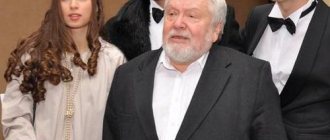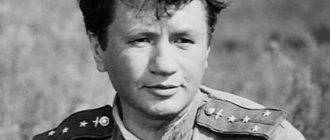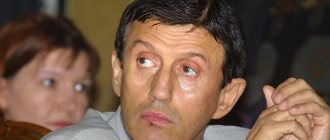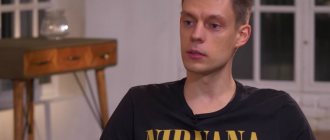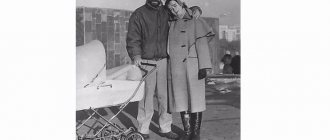Biography
Yuri Bykov was born in a small town in the Ryazan region. His mother worked at a fittings factory, and his father was a driver. The family lived in a work area in a trailer. When the boy was 6 years old, his father left them: “My parents divorced early because they were married according to village custom, they are from the Sapozhkovsky district near Kasimov. My mother was from a poor family, my father, when I was six years old, went to Tyumen, and I never saw him again. Mom got married a second time and became a housewife.” Yura's childhood fell during the crisis years of the 90s. To get money for food, he contacted a criminal group: “Somewhere to whistle something, turn over a car.” However, I gave up on this activity in time. Despite these life circumstances, the future actor was interested in literature, wrote poetry, went to music school, played in various groups, and worked in the studio as an arranger. “Coming into the specialty was quite trivial. I felt that I liked making art. “I drew, studied at a music school, published poems and stories in the regional newspaper,” Bykov says about his creative path. After graduating from school, I went to work as a loader and, having worked safely for 2 weeks, I realized that I had neither a job, nor a profession, nor the opportunity at that time to enter some serious educational institution. Then I worked for 2-3 years at a local cultural club as a disco operator and stage operator and decided to enter a creative university in Moscow. I applied not to become a director, but to become an actor. And this is my eternal drama. The choice between acting and directing remains a problem for me to this day. I'm not a pure director. I went to enroll in VGIK, the Shchepkinsky School, and the Shchukin Theater Institute. Didn't get in anywhere. And then People’s Artist of Russia Boris Georgievich Nevzorov comes to Novomichurinsk. And they showed me to him - here’s a guy who can work. He invited me to Moscow, and I arrived, entered his affiliated course at GITIS and ran away six months later. VGIK is the only place where I passed without a competition. They had a vacancy, and I transferred from GITIS to VGIK to this place and studied there for 4 years.”
In 2005, Yuri Bykov graduated from VGIK, workshop of V. Grammatikov. Then he continued his studies at the same educational institution, but at the directing department. He recalls: “In 2007-2008, I realized that it was time to combine all the skills that I had, develop them and try to take risks. I entered Vadim Abdrashitov’s directing department as a first-year student. And I had a choice - to make a short film, which I was already ready for (I had saved up money, a script was written, internal creative preparation was carried out), or pay money for training at VGIK, at least for the first year. And I chose to film the short film “Et Cetera”, Theater of the Moon directed by S. Prokhanov, Moscow Art Theater named after Maxim Gorky, Theater of the Russian Army. In the latter he played the main role in the play “The Marriage of Belugin”, but left during rehearsal due to low salary and loss of interest. For more than six years he worked as a clown-animator at the Yauza children's club.
Childhood and adolescence
Yuri was born in Novomichurinsk, a small satellite town at the Ryazan State District Power Plant. His parents, simple villagers, came to work when the village was just beginning to be built. My mother got a job as a fitter at a factory, my father worked as a driver. At first, a family with a small child huddled in a construction trailer until they received a tiny apartment in a Khrushchev building. When Yura was six years old, his father went to work in Tyumen and never returned to the family. For several years, the mother raised her son alone until she married again.
Novomichurinsk is the hometown of Yuri Bykov
Yura grew up as a rather reserved child, immersed in his thoughts since childhood. Despite difficult life circumstances, he studied well, was keenly interested in literature and art, and attended music school. As a teenager, he began writing poetry and short stories, which were even published in the local newspaper.
After graduating from school, the young man got a job at the local House of Culture, where he worked as a disco operator and stage driver. At the same time, he attended a theater studio and organized school holidays.
Yuri Bykov at the dawn of his acting career
In 2001, Bykov decided to radically change his life and went to Moscow to conquer the capital’s theater universities. He did not qualify for any of them, but was able to get into an additional GITIS course with Boris Nevzorov. Yuri met him back in Novomichurinsk, where the famous actor performed with his creative evening. Having seen Bykov on the stage of a local cultural center, he appreciated his abilities and advised him to try his hand at acting professionally. After studying for six months, Yuri transferred to VGIK to take Vladimir Grammatikov’s course, which he successfully completed in 2005.
Cinema
Yuri Bykov made his film debut in 2006 in the comedy film “Everything is mixed up in the house...”. He played the role of Gennady Petrovich Demidov. Then he appeared in episodes of such TV series as “Love as Love”, “Sea Soul”, “The Right to Happiness”, “Soldiers-13”. In 2008, the actor took part in the filming of the popular sitcom “My Fair Nanny.” In the same year, his filmography was replenished with three more films: “Ranetki”, “S. S. D.”, “Soldiers. Demobilization album." The following small works were noted in the projects: “Always say “always”-5”, “Two Sisters-2”, “Wild”, “Law and Order. Operational Investigations Department-3", "Soldiers-16. Demobilization is inevitable”, “Tanks are not afraid of dirt” and others. In 2013, the premiere of the drama “Major” took place, where Yuri acted both as an actor and as a director. The film tells the story of Russian police officers who find themselves in difficult life situations. Then he played Thin in the first season of the television series “Method,” which was released in 2020. The detective also stars Konstantin Khabensky, Paulina Andreeva, Alexey Serebryakov, Alexander Tsekalo, Vitaly Kishchenko, Timofey Tribuntsev, Yuri Kolokolnikov and many others.
"Lights of a Big Village"
In the comedy “Lights of a Big Village” directed by Ilya Uchitel, the artist appeared in the image of the head of a provincial town. The film was released on the Rossiya 1 TV channel in 2020. Plot: “Motherland” is in danger! The mayor decided to close the small cinema and open a store in its place. Only a successful premiere can save Rodina. And there is only one way out - to make a successful film. His partners on the set were Kirill Frolov, Dmitry Dyuzhev, Maxim Emelyanov, Anastasia Mytrazhik, Vasily Kortukov, Tagir Rakhimov, Karen Martirosyan, Kirill Polukhin, Anna Vorkueva.
Movies
Yuri Bykov began his creative biography in cinema as an actor, making his screen debut in 2006 in the comedy series “Everything was mixed up in the house...” in the role of Gennady Petrovich Demidov. A year later, Yuri appeared in episodes of the series “Love as Love”, “Sea Soul”, “Right to Happiness”, “Soldiers-13”. In 2008, the actor took part in the filming of the popular sitcom “My Fair Nanny,” appearing in the last episode of “Love and Carry Sleighs.” In the same year, the filmography of Bykov the actor was replenished with three films: “Ranetki”, “S. S. D.”, “Soldiers. Demobilization album."
Director Yuri Bykov
In 2009, the adventure war film “Tanks Are Not Afraid of Dirt” was released, in which Bykov got the role of Vadim Smirnov. In the crime detective “Law and Order: Department of Operational Investigations -3,” Yuri Bykov reincarnated as the hero Zhora Semenov, in the series “Soldiers-16. Demobilization is inevitable,” the actor played the role of Private Soponar.
Yuri Bykov in the TV series “Law and Order”
In 2009, Yuri also made his directorial and producing debut. Bykov directed the short film “Chief”, in which he played the main role of the FSB captain. Actors Alexander Golubkov, Andrey Bulatov, Sofya Anufrieva also took part in the film. In the same year, the film received the main prize at the Kinotavr film festival in the category “best short film.”
In 2010, at the Rock studio, Yuri began working on the full-length feature film “Live,” for which he received awards from the Golden Phoenix and Amur Autumn film festivals. The drama told how an accidental witness to the crime, a local villager Mikhail, saves the life of the murderer’s victim Andrei and escapes with him. The producers of the film were Alexey Uchitel and Kira Saksaganskaya; the director wrote the script and music himself. The main roles in the film were played by Vladislav Toldykov, Denis Shvedov, Konstantin Strelnikov and Alexey Komashko.
Still from Yuri Bykov’s film “Live”
In 2011, Yuri Bykov began working on the crime series “Collectors,” in which the main characters were played by Daniil Strakhov, Elena Lyadova, Alexey Komashko and Denis Shvedov. The film premiered in 2012 on the Ukrainian channel Inter. In Russia, the series was first shown in 2020 on Channel Five.
In 2013, in the film “Major,” the director again turned to the topic of a person’s moral choice: to suffer a well-deserved punishment for a crime committed or to make a deal with his conscience. The film premiered at the Cannes Film Festival as part of Critics' Week.
Yuri Bykov in the film "Major"
The film received a number of awards, including the XVI Shanghai International Film Festival, Kinotavr, as well as festivals in France, Germany, Poland, and Iran. The main cast included Denis Shvedov, Irina Nizina, Ilya Isaev. Yuri Bykov appeared in the film as Pavel Korshunov, the antagonist of the main character Sobolev.
Filming of Yuri Bykov's film "Fool"
In 2014, Bykov’s social drama “The Fool” was released. The film was about a volunteer who independently tries to help the residents of a dilapidated hostel, but as a result is faced with a lack of understanding from the authorities, relatives and residents of a dilapidated house. The premiere took place at the Kinotavr 2014 International Film Festival, where it received the prize for best script. In addition to another award at the Locarno Film Festival, in 2015 the film was included in the top five of the top list of popular films according to the American edition of The New York Times.
Yuri Bykov in the film "Method"
In 2014, Yuri joined the director’s team of the comedy “Yolki 1914” along with Timur Bekmambetov, Dmitry Kiselev, Alexander Kott, Alexander Karpilovsky. Yuri filmed the episode “Bear” for the comedy.
In October 2020, Channel One premiered the thriller “Method” starring Konstantin Khabensky, Paulina Andreeva, and Alexey Serebryakov. The film became a nominee for the Golden Eagle Award in the category “best television series of the year.”
Director
In 2009, Yuri made his directorial debut. In the short film “Chief”, he also acted as a producer and actor, playing the main role of an FSB captain. The film featured artists Alexander Golubkov, Andrey Bulatov, Sofya Anufrieva. In the same year, the film received the main prize at the Kinotavr film festival in the category “Best Short Film”. Then Bykov filmed his first full-length film, “Live.” The action-packed drama tells how a random witness to a crime, a villager named Mikhail, saves the life of the murderers’ victim Andrei and escapes with him. The producers of the project were Alexey Uchitel and Kira Saksaganskaya. The main roles in the film were played by Vladislav Toldykov, Denis Shvedov, Konstantin Strelnikov and Alexey Komashko. “I am very dissatisfied with my painting “Live.” I am dissatisfied, first of all, because it was shot in my head completely differently. The feeling that you could do so much more never leaves me. Unfortunately, I cannot be held responsible for the final result. But at the level of the script and ideas, discussions with the cameraman and actors, I can. Although my teacher once said that if you think that something else could have turned out, then know that what turned out was exactly what could have turned out in these circumstances. This helps not to go crazy. The film “To Live” was shown at Kinotavr. The producers who wanted to work with me when they watched “The Chief” suddenly didn’t want to work with me. The attempt to make a genre film did not work out. It turned out that cinema is a segment. You must understand why you are making films: for a festival, for commercial release, for television screening. I felt like I made a movie for everyone. A colossal youthful mistake. There is no cinema for everyone. Because it’s absolutely impossible not to understand what segment you’re making a movie for. For example, Zvyagintsev understands that he is aiming at a large Western festival. After the film “To Live,” the next stage in my life began—adjustment. This is the moment when you have skills, they know you, you already know how to say “stop the engine,” swear with the director, tear out your hair. That is, you are an inexpensive director who hasn’t fallen asleep and can be put on a fairly cheap and relatively low-risk series,” says the director. And this drama was awarded prizes at the international festival “Stalker” and festivals in Smolensk and Blagoveshchensk. Later, Yuri Bykov made such films as: “Collectors”, “Major”, “Fool”, “Yolki 1914”. And in 2015, the premiere of the thriller “Method” took place with the participation of Russian film stars - Konstantin Khabensky, Paulina Andreeva, Alexei Serebryakov in the leading roles. He recalls how Bykov joined the project: “I ended up in the third echelon, as they say. Alexander Evgenievich Tsekalo established contacts with a very extravagant screenwriter - Dmitry Ivanov.
The second echelon was the need for a star. It seems that Khabensky had already negotiated with Tsekalo on previous projects and agreed on the condition that there would be a director. At some point, the question of the director came up. Khabensky needed a fairly serious dramatic director, and at that time they had already gone through all the top ones. I wasn’t such a top guy, and most likely I’m not like that now. But when my name came up, Kostya said that he knew me and that he liked my painting “Major,” so they invited me.” It should be noted that the film was nominated for the Golden Eagle Award in the category “Best Television Series of the Year”. In 2020, the director participated in the work on the historical film “The Time of the First” about the life of cosmonaut Alexei Leonov, who made the first spacewalk. However, due to disagreements with the producers of the film, Yuri was removed from filming. “At first there were no signs of trouble. This time Bekmambetov himself invited me to the shooting, he gave me the necessary introductions. Then we mainly communicated with Zhenya Mironov, who, in essence, led the project for a whole year,” says Bykov. — Timur was working on his own film “Ben-Hur” at that time. When he finished filming Ben-Hur, he took the reins into his own hands. And soon he changed me to another director.” Also, filming in the series “Stanitsa” ended in failure; Yuri left straight from the director’s “bridge” because he did not want, in his words, to “film a hack job.” In 2020, the director completed work on the series about the special services “Sleepers”, and is currently completing the social drama “Plant”.
Yuri Bykov
dnipro19
• 04/06/2020 at 21:36 • Negative
“Watchman”, 2019
……The whole viewing I had the feeling that Yuri Bykov was so immersed in his character during filming that he adjusted his direction to this guy, making her as apathetic as possible , dull, gray, depressive, etc. The truth is, in “The Watchman” there are individual scenes that try to get off the ground, metaphorically speaking, emotionally, but never get off the ground......The author uses some amazing amount of clichés and cliches in his work. It was so amazing that at first I couldn’t believe my eyes, because in some places I literally guessed the development of events long in advance. Moreover, the director did not hesitate to use scenes designed to cause a feeling of physical discomfort in the viewer, and this was done very clumsily, unfortunately... All the characters in the film are described in extremely large strokes. Part of the story of the main characters is revealed as the plot progresses, including towards the end of the film. The problem is that the most unpretentious viewer guesses their secrets almost immediately. The problems are too simplified, the colors are too condensed, the hopelessness is too obvious. There is nowhere to go, nothing to fix - why then all this cinema?...
…….What immediately catches your eye is the extremely strained acting, from the “I don’t believe it at all” category. Even a couple of scenes where the intensity should have been concentrated looked very bland. When the heroes reveal the secrets of their closets, those same hidden skeletons look like emotionless voiced, as if they were strangers, and not their own troubles and secrets, not like the shocking revelations of the characters, for whom the same viewer should feel sympathy...... The worst performers in this movie were Bykov- screenwriter and Bykov-composer. The first one, apparently, by the middle, stopped understanding where he was leading this whole round dance of events, gave up and concentrated on the plot twists (there are many of them, thank you, apparently this is important) in the hope that Bykov the director will figure it all out himself, and Bykov the composer wrote an unremarkable soundtrack for all this, with a piano playing a well-worn harmony, in full confidence that this movie would be good even if a spoon hits a bucket..... The next and also the main weak point of the film is the main character. He is incomprehensible. The watchman, played by Yuri Bykov himself, is a loser with a sense of guilt. He looks like a hypochondriac, but in some scenes the masculine core suddenly appears. The character's laconicism only adds to the questions.
……And the film itself is about absolutely nothing. The guard's stony and indifferent face. Alla Yuganova as an alcoholic and a woman who easily changes priorities (if the main character were a dog, her heroine would lie under the dog). Vlad Abashin, who perhaps (but this is only possible) is trying to draw out the entire film so that the viewer at least understands what he is talking about...... Now Bykov did not find any actors capable, and most importantly, willing, to play the role of Bykov. This is probably why Bykov invited the sad, semi-intelligent watchman, and also the graphomaniac screenwriter Bykov, the personification of the foggy Bykov alcohol reality. Then he reinforced his plot with the alcohol-addicted and unprincipled Vera, aimlessly walking around the empty sanatorium, who sooner or later, someone must rape right in the frame.....I DO NOT recommend it
Personal life
The actor is not married and has no children. In one of his interviews, Yuri Bykov admits: “When I think about family, about children, I have a natural stupor: how can I bring a person into this life if I myself am not happy? Having a child because I'm bored would be cynical. It seems to me that you should give birth to a child, understanding that you can make him happy. That you can show him this path of happiness. Because if a person is born in the dark, then what can he do? Nothing. Happy people should give birth to children.”
Interview
Provincial education
“I was raised by people who were urban only in the first generation, and only relatively so. Because with my mother and her first husband, my father, we started living in a trailer. Well, what is provincial upbringing? In a fairly clear definition: what is “good”, what is “bad”. And what is a “problem” and what is “no problem”. That is, the vision of life, it is mainly focused on the fact that... when you have nothing to eat, or when you are sick, or when you have nowhere to live, this is a problem. When it's the other way around, you have no problems. This, in fact, is the upbringing that my mother gave me. Well, besides the fact that “the little son came to his father, and the little one asked…” and so on. This is what I consider normal provincial upbringing.”
About Moscow and...
“There is a proverb: “Find your own and calm down.” Over the 15 years of living in Moscow, I realized that I had not found any of my own. But, perhaps, I lost those who were really close to me there.
In Moscow, people live in a fanatical search for something that does not exist. Something not related to reality. It seems to me that human life is so short that at some point a person must find an environment. And if he constantly changes everything - at 40, and at 50, and at 60 - this means that he has some kind of mental problems. If a person does not have a family, a home, that very tree, if he does not love life and always wants to turn it upside down, if he is not interested all the time, then either he is an endless romantic or a fool. It’s clear that we are grateful to the Lord God for making fools of us, and we - fools - make the world more colorful. But this doesn’t make it any easier for us.”
About creativity and commerce
“Due to the fact that people are not naturally educated, they do not understand that there is a division into auteur cinema, non-auteur cinema, commercial and non-commercial cinema. And the complaints against me are quite simple: why not film something fun, kind, life-affirming. To which I always answer very simply that there are quite a few people who make funny, kind, life-affirming films. But that’s why I don’t interfere, I don’t force myself to be friends with some rich people, so that my movie will be released in some huge number of copies in our country and fly out of every screen, from every iron. No, I make films that are not distributed from the point of view of imposing on the viewer, but are simply sought by the viewer who, as young people say, needs such content. Roughly speaking, if I want to watch a realistic, serious, thoughtful movie, then I go on the Internet to see what is being filmed, written, composed, and so on, and at some point I find Sigarev, Khlebnikov, Bykov, for example. I think this is a normal process. Because it’s commercial, it’s... well, it’s a waiter’s niche, it’s a service sector. It, of course, should bring people the maximum amount of pleasure. And a simple one. This is what it was made for. As soon as the wide cinema passed into the category of waitership, at that moment certain rules of the game appeared. And these are just the rules of the game, it is not good and not bad. This is how the wide format, the wide screen is structured now, that it is basically an entertaining movie. And this, firstly, is expensive. And not everyone in our country - well, I know what salaries are, my mother works as a nurse for 5 thousand - I know that spending an extra 200-300 rubles to go on a day off with the children... well, you won’t go to the film “Fool”, where they hit you on the head and shout obscenities. You will watch some fairy tale. Or a comedy. To relax. And it’s the same with TV content. If you need to iron things, cook soup and vacuum at the same time, you will watch the series “Trace”, but not “War and Peace”. Therefore, I take this very simply: there are people who work in the service sector, and there are those who are engaged in creativity. Everything is different. Someone is making money. Someone wants to speak. I... for me money is not the most important thing. That’s why I shoot what I shoot.”
About your viewer
“These are people already at a fairly mature age. People who have the right and opportunity to make their own decisions in life. And they are trying to find some landmarks. Again, “what is good” and “what is bad.” But not from a primitive point of view, not from the point of view of parental doctrine, at the level of a six-year-old child. And from the point of view of real life, when you need to adapt yourself, you need to understand to what extent you can reach a compromise and to what extent you cannot. That is, young people like me who are trying to live more or less according to their conscience. If it works out, of course. This is somewhere between twenty-forty-five-fifty years. Well, you don’t even need to show it to younger people, probably, so as not to traumatize the child’s psyche. Yes, no one will understand. It's like teaching Dostoevsky in the 8th grade. This is nonsense, of course. To whom will you explain what “cantilena”, “perspective” and so on are? Likewise, after 50, 60 years, people have already lived, they need to calm down, put themselves in order, collect stones, and prepare for death. Well, why traumatize them too and say that they have lived wrong all their lives or have not lived like that. No, from my point of view, I am quite calm and reasonable about why watch my films. I don’t show my films to my mother. Well, why? She already has enough problems. She knows that her son is filming something there, works as a director, earns a piece of bread, doesn’t lie on the street, isn’t drunk, isn’t ragged - that’s enough for her.”
About faith in God
“For myself, I have the feeling that something like this, of course, exists. After all, everything consists of nothing. Sometimes I even have a panic attack. In everything there is form, there is development, there is structure and composition - and “no one” came up with all this?
Maybe the essence of life is to go crazy one day? Because how can you accept in your right mind that you will never know what everything is made of? If there is some kind of plan, then I will probably find it. The worst thing for me is if there is no plan. Logically, without a way to personally get the answer, how can we know anything for sure? Guess? In my opinion, the ability to believe is as much a given as an arm and a leg. Some have it, some don't. What a cynical thing it turns out to be... Some people are given the power to believe, but others are not given the power to believe. And what should a person who is not given it do? To suffer?
Knowledge increases sorrow. In fact, I understand that at some point it was necessary to stop in my search for the essence and not dig further. And I dug it up. And what should I do now?
That's what's offensive. As soon as a person has had a good time, drunk, or broken away, he immediately begins to believe in God. After the depression, everyone immediately converted to Orthodoxy. And no matter how much it pains me, I still realize that believing in myths is an insult to common sense. I'm not saying there is no God. He is. But this is not a man with a beard. God is, in principle, everything. God is neither good nor bad. He is the one who shapes this entire space, regardless of our desires and prayers.
Everything can be taken away from a person - family, health, arms, legs. But the only thing that remains with a person until death is his sanity.”
Moments of joy
"Food. Music. Movies. Aesthetic pleasure. And then, closer to evening. Overcoming. When I understand that I was really bad, right to the point of death, and I overcame it, then I feel better. This happens every day and many times. But all this brings me not so much joy as relief. There is probably no joy as such in my life.”
The message of "Fool" and "Major"
“The friend-or-foe value system destroys society. A feudal system arises that cannot work in the modern world; there are too many social connections. Therefore, when politicians, officials, bandits create this system, they can ultimately suffer from it and often do. The message of the film "Major" is that if you leave this value system, you will also die like those you kill. The message of the film “Fool” is that one is not a warrior in the field. “Good” must be born from a logical combination of circumstances. The situation can be corrected only if a large number of people do not want to give, for example, a bribe to a traffic cop. I see the feasibility of shooting such pictures. We need to spark a public debate.”
Director Yuri Bykov: “The audience for auteur cinema is on the Internet”
Yuri Bykov is known for such emotionally strong problematic films as “Live”, “Major”, “Fool”, “Factory”, as well as for successful series that gained high ratings on television.
Initially, Tula residents were invited to a meeting with the director, viewing and discussion of the film “Plant”, but literally within a day the program changed. Instead of “Plant,” guests of the creative industrial cluster “Octave” were shown a film with a five-year history.
As it turned out, “The Fool” is known and loved in our city, the director was bombarded with questions, and Yuri Anatolyevich himself recalled with pleasure the days when he filmed the film in Tula. But first, Bykov complimented our “Octave”:
– This is an awesome place, I didn’t even know that everything here was on such a scale. At the entrance it was written “cluster”. It's cool that you have a place like this, a space where you can all get together, lash out at someone and, if possible, get honest answers. By the way, today I was on Metallurgov Street, 85, and saw the hostel that I rented in “Fool”, five years later. It was winter, we filmed for a little over a month and a half.
It was one of the most difficult periods in life in general, and it also coincided with the winter night picture.
Well, I won’t reflect, in short, I went to the memorable places and looked - by and large, nothing has changed. The hostel is located, next to SPAR, there is a tram, only summer, the greenery is already more cheerful. It was fun then too, but with the help of other things besides the sun and blue sky (laughs). And now I'm waiting for your questions.
— You said that you didn’t expect the film “Fool” to be widely shown. Why then make an auteur film if only a small number of viewers see it?
– This is a complex and interesting question. Are there films that you like? Name any.
- "Forrest Gump".
– I agree, a large number of people watched it. But there are people who did not watch it, and over time the number of such people will multiply. A very simple principle applies here: the film is, of course, made for the audience, making it for yourself is crazy, although there are such directors. There is a well-known saying: if a work of art is understandable to the artist and God, it is a great work of art, but if it is understandable to the artist, God and the artist’s wife, it is a little worse. But still, everything that an artist, musician, poet, director does is to contact another person, to receive a response. But even a film like Forrest Gump won't be as interesting to audiences as The Avengers right now. The audience changes, generations change. The second point: the wide screen audience is now also a relative concept. And this audience is not adults. If you ask me, I can get away with it and say that I am watched on the Internet, as well as a large number of other auteur directors.
I think you yourself will take your children by the hand, your husband or girlfriend and go on Saturday to watch a more or less positive movie that will bring you positive emotions to spend the evening with pleasure. In the 60s and 70s, young people, especially in Europe and America, went to see difficult movies: Midnight Cowboy, The Deer Hunter, The 400 Blows - and these films did well at the box office. Adult audiences have left cinemas, so the question now is not who you are filming for. You can make a film, post it on the Internet, and the next day a director, for example Klebnikov, will have a million views. Another point is how to monetize it, how to return the money that was invested in the picture. We don't have a subscription culture on the internet.
Sometimes some strange people write to me: let me send you 500 rubles. I say, come on, we’ll buy potatoes, mushrooms, fry it and eat it together (laughs).
— Why did you choose Tula and Metallurgov Street for “The Fool”?
– Everything is very simple, no mysticism. We needed a hostel. Filming in Moscow is very expensive, the search was concentrated around Lipetsk and Tula, Vladimir and Yaroslavl were also considered. But in the end we agreed on Tula. This is a direct transport line of communication with Moscow - both a road and railways, it’s not far, you can transport artists. One day we were driving and saw a hostel standing on a hill, a relative wasteland, although SPAR prevented us from creating a feeling of abandonment (laughs). But you could run there to buy food and a lot of other interesting things (laughs).
— How did you come up with the idea to use Viktor Tsoi’s song in the film? This is a very strong point of the film.
– This technique is actually very frontal. I needed it to emphasize that the hero of the film, Dima Nikitin, is not from this time. “Good Night” by Viktor Tsoi personifies a kind of artistic despair, serious adult frustration. This is a song from the time when the hero had a Soviet-pioneer consciousness and a desire to get rid of this baggage. Dima Nikitin still has a black and white consciousness - since childhood he knows what is good and what is bad. Today's youth, who want to change the world, have a different consciousness. They are more free. It seems to me that the music here worked the same way as the songs in “Brother” by Alexei Balabanov. The hero’s passage through the streets of Tula to Tsoi’s music is manipulation. So how did this “fool-simple” who fell from Emelya’s stove end up in this time? And I used the image of a very charismatic hero of that time, who sang about the fact that “we want change.”
- If you had the opportunity to make a series - the budget is unlimited, the plot - whatever you want, what would this series be about?
– I wouldn’t have filmed anything then (laughs). I am a person who only works when I need to get out of a situation. I tried to work with a big budget, but it didn't work out. I still think that after that cherished pause, which I will have to take due to various circumstances, I would like to return to the format that I had in the film “Major”. When everything is very minimal, and only meanings matter. My friend once said about me: “You are embarrassed to live.” I have made many mistakes in my life. But I did everything through the feeling that I didn’t need much, and I didn’t particularly pretend to anything. Just give me a matchbox, a knife, two pieces of wood, and I’ll build you something. But give me unlimited possibilities - my eyes will run wild. I have freedom of choice in that comfort zone, when I don’t have much choice. For me, the microcosm is much more important than the macro. The more complex it is, the easier it is to come up with. And when they say - here you go, take what you want, I don’t want anything anymore. This is, by and large, the same as with girls (laughs).
From the Myslo dossier
Yuri Anatolyevich Bykov Born on August 15, 1981 in Novomichurinsk, Ryazan region. Russian film director, screenwriter, composer, producer and actor. As a child, he was interested in literature, wrote stories and poems for the local newspaper, went to music school, played in musical groups, and worked as an arranger in a local studio. Graduated from the acting department of VGIK (workshop of V. Grammatikov). After VGIK he played in theatres: Moscow Art Theater, Et Cetera, Theater of the Moon, Theater of the Russian Army. As a director he made films: “Chief” (short film), “Live”, “Collectors” (TV series), “Major”, “Fool”, “Yolki 1914” (short story “Bear”), “Method” (TV series), “ Sleepers" (TV series), ". The film “The Fool” received a prize for best script and a diploma “For uncompromising artistic expression” at Kinotavr 2014.
Gallery
show all photos
Prizes and awards
- Nika Award for best script for the film “Fool” (2015)
- Matryoshka at the Georges Film Festival for the best Russian drama of the year. Painting “Fool” (2015)
- Special prize “for humanism” at the Locarno Film Festival for the film “The Fool” (2014)
- Award for Best Screenplay and Diploma of Film Scholars and Film Critics at Kinotavr for the film “Fool” (2014)
- “Nika” for Best Supporting Actor in the film “Major” (2013)
- Press award at the Cannes Film Festival for the film “The Major” (2013)
- Special Prize of the General Producer of the Amur Autumn Festival Anton Kalyuzhny – director Yuri Bykov, film “Live” (Blagoveshchensk) (2010)
- Kinotavr 2009. Main prize of the Short Film competition. Film "The Chief" (2009)
Based on materials from Wikipedia and websites: russia.tv, kino-teatr.ru, nn.ru, 24smi.org, tvtambov.ru, eclectic-magazine.ru, igromania.ru, kinopoisk.ru,
Filmography: Actor
- High Heels (2018)
- Sleepers (2017)
- Lights of a big village | Big village lights (2016)
- Method (2015), TV series
- Major (2013)
- Cash collectors (2011)
- Chain (2009)
- Tanks are not afraid of dirt (2009)
- Soldiers-16. Dembel is inevitable (2009), TV series
- Chief (2009)
- Law and Order: Department of Operational Investigations -3 (2009), TV series
- Wild (2009)
- Two sisters-2 (2009), TV series
- Always say “always”-5 (2009), TV series
- Visyaki-2. Control Crimes Department (2009), TV series
- Ranetki (2008-2010), TV series
- S.S.D. (2008)
- Soldiers. Demobilization album (2008), TV series
- My Fair Nanny (2008), TV series
- Soldiers-13 (2007), TV series
- The right to happiness (2007), TV series
- Sea Soul (2007), TV series
- Love is like love (2006-2007), TV series
- Everything is mixed up in the house... (2006), TV series



